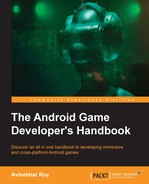Fun is the keyword that creates the necessity for entertainment in life. There are many platforms made for entertainment, and games are one of those platforms. There are many types of games available around the world. There were times when gaming was limited to sports, board games, card games, and the like. Then, games entered the digital domain with specific gaming devices. Gradually, they have come to the mobile platform now. Android is one of the most promising platforms. The Android market is growing each day and Android gaming is growing with it.
This book is mainly aimed at game programmers. Many people consider game programming the same as any other programming job. However, my personal opinion differs—game programming is not about sitting with an open code editor and typing in a computer language, it's about creating a medium of spreading entertainment.
This book is focused on the technical part of developing a game, especially for Android. It will help a developer create games in a better way. Game programming is far more logical than technical. I have tried to clear that logic in this book with my experiences throughout my career so far.
Chapter 1, Android Game Development, will introduce you to the guidelines and rules of game development on the Android platform.
Chapter 2, Introduction to Different Android Platforms, will disclose the current variants of Android devices, such as smartphones, TVs, tablets, and smartwatches. It will elaborate all the possible difficulties while creating a game on these platforms and the possible solutions.
Chapter 3, Different Android Development Tools, will expose the different tools available to develop an Android application and how to choose suitable tools for specific purposes.
Chapter 4, Android Development Style and Standards in the Industry, will cover the current development style and standards in the game development domain. This will mainly talk about Java game coding standards and styles on the Android SDK.
Chapter 5, Understanding the Game Loop and Frame Rate, will demonstrate the creation and maintenance of game loop using the Android SDK (Java). This chapter will also cover the effects of game loop on the frame rate.
Chapter 6, Improving Performance of 2D/3D Games, will explain all the constraints of 2D and 3D game development on Android, along with the common mistakes and ways to avoid them in order to improve performance.
Chapter 7, Working with Shaders, will describe the use of shaders on the Android platform. It exposes the use of shaders through OpenGL and its scope in game development.
Chapter 8, Performance and Memory Optimization, will provide in-depth knowledge of optimizing any Android game.
Chapter 9, Testing Code and Debugging, will teach you the different ways to debug an Android game.
Chapter 10, Scope for Android in VR Games, will introduce you to virtual reality for game development on Android. This chapter describes various scopes of VR and its future in game development.
Chapter 11, Android Game Development Using C++ and OpenGL, will briefly explain game development using C++ and OpenGL.
Chapter 12, Polishing Android Games, will focus on the completion of an Android game and make it ready for release.
Chapter 13, Third-Party Integration, Monetization, and Services, will elaborate the possible integration of any third-party tools or SDKs in order to monetize the game.
